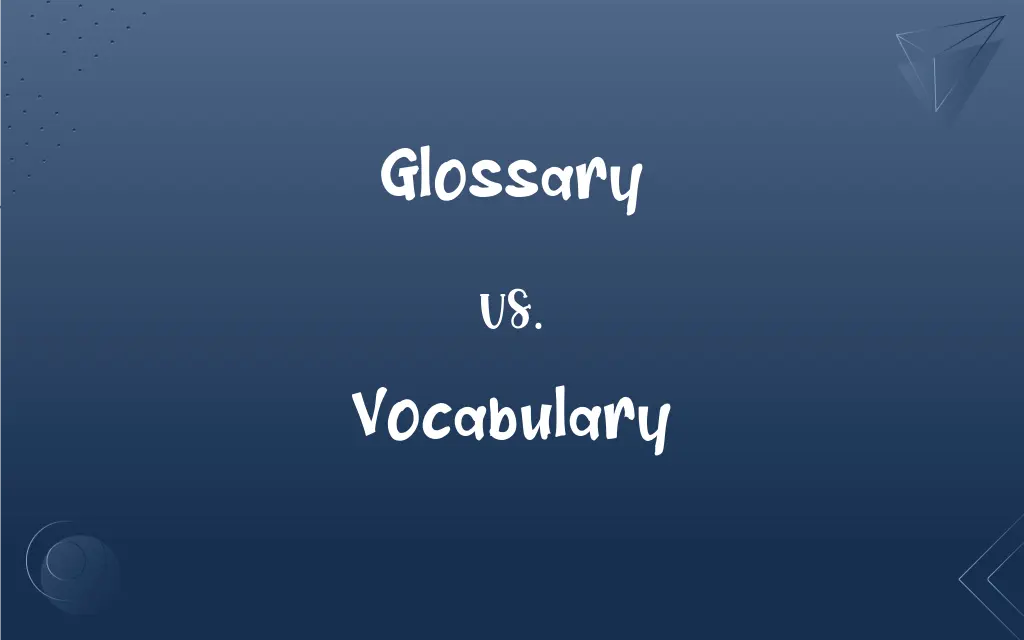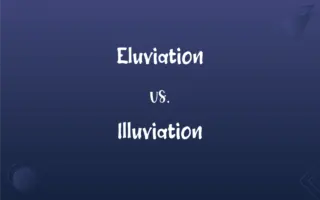Glossary vs. Vocabulary: What's the Difference?
Edited by Aimie Carlson || By Harlon Moss || Updated on November 6, 2023
A glossary is a list of terms in a particular domain of knowledge with definitions; vocabulary is the set of words within a language known to a person or used in a particular book.

Key Differences
A glossary is a specialized list of terms and definitions often found at the end of a book, article, or in a field of study. It is an alphabetical list of words pertaining to a specific subject, with explanations; a reference tool to aid understanding of specialized language. Vocabulary, however, is a broader term that encompasses all the words known and used by a person, or all the words in a language or a particular piece of writing.
Glossaries are typically found in textbooks or technical materials where readers may not be familiar with terms used. A glossary serves as a mini-dictionary for a particular document or field. Vocabulary is not limited to a specific text and does not come with definitions; it represents a comprehensive body of words that are part of a language or are known to an individual.
For instance, a medical textbook will have a glossary that includes terms like "bradycardia" or "hemostasis" with their definitions. In contrast, a medical student’s vocabulary includes all the words they know in both medical fields and everyday life, without necessarily having definitions attached to them.
While a glossary is a tool for understanding and is curated and limited to relevant terms, vocabulary is an aspect of language learning and usage. The former is static, contained, and associated with a specific context, whereas the latter is dynamic, expansive, and personalized.
Glossaries and vocabularies both deal with words and meanings, but their purposes differ: a glossary is for clarification within a context, and vocabulary is an element of language proficiency. The glossary is a map to navigate specific terrains of language, while vocabulary is the territory of language one has explored and acquired.
ADVERTISEMENT
Comparison Chart
Definition
An alphabetical list of terms with definitions.
The set of words known to a person or language.
Purpose
To provide definitions for specialized terms.
To indicate the extent of one's language knowledge.
Usage
Found in texts or fields with specialized language.
Used in general language acquisition and communication.
Nature
Static and text-specific.
Dynamic and expansive.
Function
Reference tool for clarification.
Indicator of language proficiency.
ADVERTISEMENT
Glossary and Vocabulary Definitions
Glossary
An alphabetical list of words with definitions, especially in a book.
She referred to the book's glossary to understand the technical jargon.
Vocabulary
The body of words used in a particular language.
English has a very large vocabulary compared to many other languages.
Glossary
A collection of terms in a particular domain of knowledge.
The biology textbook included a glossary of scientific terms.
Vocabulary
The range of language used by a person in speech and writing.
The author's vocabulary was both rich and varied, providing depth to her stories.
Glossary
A list of words with their meanings, especially in a specialized field.
The legal document came with a glossary for easier understanding.
Vocabulary
All the words that a person knows or uses.
Her travels abroad greatly expanded her vocabulary.
Glossary
A section of a book containing explanations of unfamiliar, technical, or specialized words.
The complex novel came with a glossary for its rich but difficult vocabulary.
Vocabulary
A list or collection of words or of words and phrases usually alphabetically arranged and explained.
He bought a vocabulary book to improve his language skills.
Glossary
An appendix in a book containing explanations of terms used within it.
The historical texts were often accompanied by a glossary of archaic terms.
Vocabulary
The words used in a particular context or profession.
Medical professionals often use a vocabulary unfamiliar to the layperson.
Glossary
A list of often difficult or specialized words with their definitions, often placed at the back of a book.
Vocabulary
All the words of a language.
Glossary
A list of terms in a particular domain of knowledge with their definitions.
At the back of the book you can find the glossary.
Vocabulary
The sum of words used by, understood by, or at the command of a particular person or group.
Glossary
A collection of glosses or explanations of words and passages of a work or author; a partial dictionary of a work, an author, a dialect, art, or science, explaining archaic, technical, or other uncommon words.
Glossary
An alphabetical list of technical terms in some specialized field of knowledge; usually published as an appendix to a text on that field
FAQs
Should every book have a glossary?
Not necessarily; glossaries are typically for texts with specialized terms.
Does one’s vocabulary size affect language proficiency?
Generally, a larger vocabulary indicates higher language proficiency.
How often is a glossary updated?
A glossary is usually updated with new editions of the text it accompanies.
Is a glossary the same as a dictionary?
No, a glossary is specific to a text or field, while a dictionary is comprehensive.
Can a glossary include slang terms?
Yes, if slang is relevant to the subject of the text.
Can vocabulary refer to multiple languages?
Yes, a person can have a vocabulary that includes words from different languages.
Does vocabulary growth plateau at a certain age?
Vocabulary can continue to grow throughout one's life with continued learning.
Should a glossary be memorized?
Understanding the terms is more important than memorization.
Are glossaries found online?
Yes, many online resources and e-books include glossaries.
Can a vocabulary be specialized for certain fields?
Yes, professions often have a specific set of jargon or terminology.
How can I improve my vocabulary?
Through reading, conversation, and educational resources such as vocabulary books.
What is the benefit of a glossary in textbooks?
It helps students understand and remember key terms.
Does a large vocabulary always mean better communication?
Not necessarily; clarity and context are also important.
Is vocabulary learned or innate?
Vocabulary is learned through exposure to language and study.
Are all terms in a glossary necessary to understand a text?
Essential terms are included to aid understanding; some may be more specialized.
Do bilinguals have separate vocabularies for each language?
Yes, they have distinct vocabularies for each language they speak.
How do I choose which words go into a glossary?
Include terms that are specialized, technical, or not widely known.
Can improving vocabulary help with career advancement?
Yes, effective communication is often key in professional settings.
Is it possible to know every word in a language?
Given the vast number of words and constant evolution of language, it is unlikely.
Can the terms in a glossary be considered part of one's vocabulary?
Yes, once learned, they become part of a person's vocabulary.
About Author
Written by
Harlon MossHarlon is a seasoned quality moderator and accomplished content writer for Difference Wiki. An alumnus of the prestigious University of California, he earned his degree in Computer Science. Leveraging his academic background, Harlon brings a meticulous and informed perspective to his work, ensuring content accuracy and excellence.
Edited by
Aimie CarlsonAimie Carlson, holding a master's degree in English literature, is a fervent English language enthusiast. She lends her writing talents to Difference Wiki, a prominent website that specializes in comparisons, offering readers insightful analyses that both captivate and inform.































































